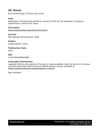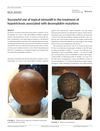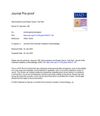 10 citations,
May 2020 in “Journal of The American Academy of Dermatology”
10 citations,
May 2020 in “Journal of The American Academy of Dermatology” Taking spironolactone doesn't increase the chance of breast cancer coming back.
 7 citations,
April 2021 in “Dermatology and Therapy”
7 citations,
April 2021 in “Dermatology and Therapy” H-1 antihistamines may help with various skin conditions, but more research is needed to confirm their effectiveness.

Onabotulinumtoxin-A effectively treated a painful scalp condition when other treatments failed.
 7 citations,
March 2021 in “Journal of the American Academy of Dermatology”
7 citations,
March 2021 in “Journal of the American Academy of Dermatology” Tofacitinib can regrow hair in alopecia areata patients, but some may experience flares during treatment.
 8 citations,
August 2020 in “Clinical and Experimental Dermatology”
8 citations,
August 2020 in “Clinical and Experimental Dermatology” Spironolactone is a low-cost, effective, and generally safe treatment for various skin conditions related to hormones.
 January 2025 in “Journal of the American Academy of Dermatology”
January 2025 in “Journal of the American Academy of Dermatology” Low-dose oral minoxidil alone is effective for treating hair loss, but combining it with dutasteride or finasteride may offer better results.
 November 2024 in “JAMA Dermatology”
November 2024 in “JAMA Dermatology” Low-dose oral minoxidil may help with hair loss, but more research is needed.
 77 citations,
July 2007 in “Dermatologic Therapy”
77 citations,
July 2007 in “Dermatologic Therapy” Methotrexate is a key, cost-effective drug for skin conditions, but requires careful monitoring for side effects.
 30 citations,
January 2000 in “Dermatologic Clinics”
30 citations,
January 2000 in “Dermatologic Clinics” Finasteride and minoxidil are effective FDA-approved treatments for androgenetic alopecia.
 9 citations,
January 2014 in “Dermatology online journal”
9 citations,
January 2014 in “Dermatology online journal” Bimatoprost 0.03% helps grow eyebrow hair.
8 citations,
November 2017 in “Current problems in dermatology” Cancer treatments targeting specific cells often cause skin problems, which can affect how much medicine patients can take.
 7 citations,
June 2015 in “Journal of The American Academy of Dermatology”
7 citations,
June 2015 in “Journal of The American Academy of Dermatology” Finasteride helps treat frontal fibrosing alopecia, improving or stabilizing the condition in many patients.
 1 citations,
August 2019 in “Pediatric dermatology”
1 citations,
August 2019 in “Pediatric dermatology” Topical minoxidil helped an 8-year-old boy with a genetic hair disorder grow hair.
 March 2024 in “Journal of the Dermatology Nurses’ Association”
March 2024 in “Journal of the Dermatology Nurses’ Association” Low-dose oral minoxidil is being revisited as a promising hair loss treatment.
 January 2024 in “Expert Opinion on Pharmacotherapy”
January 2024 in “Expert Opinion on Pharmacotherapy” Low-dose oral minoxidil is effective and safe for treating hair loss in men and women.
 July 2020 in “Journal of the American Academy of Dermatology”
July 2020 in “Journal of the American Academy of Dermatology” Spironolactone does not increase the risk of breast cancer recurrence.
September 2022 in “Chinese Journal of Dermatology” Low-dose oral minoxidil can effectively treat hair loss.
 22 citations,
March 2000 in “Clinics in Dermatology”
22 citations,
March 2000 in “Clinics in Dermatology” Many treatments for hair loss lack proper testing and FDA approval, so their effectiveness is uncertain.
 September 2022 in “Hair transplant forum international”
September 2022 in “Hair transplant forum international” JAK inhibitors like baricitinib are a new FDA-approved treatment for alopecia areata, but safety data is incomplete.
 99 citations,
July 2017 in “Clinical Reviews in Allergy & Immunology”
99 citations,
July 2017 in “Clinical Reviews in Allergy & Immunology” New treatments for Alopecia Areata show promise but need to be more effective and affordable.
 57 citations,
October 2013 in “international journal of endocrinology and metabolism”
57 citations,
October 2013 in “international journal of endocrinology and metabolism” Female pattern hair loss is common, linked to polycystic ovarian syndrome, and treated with topical Minoxidil.
 42 citations,
August 2013 in “International Journal of Women's Health”
42 citations,
August 2013 in “International Journal of Women's Health” Female pattern hair loss is caused by multiple factors and while treatments like topical minoxidil, hormone therapy, and low-level light therapy can help, none can fully cure it.
 42 citations,
January 1998 in “BioDrugs”
42 citations,
January 1998 in “BioDrugs” Azathioprine's effectiveness and safety require careful monitoring and more research, especially regarding its use with corticosteroids and the role of TPMT status in patients.
 39 citations,
January 2019 in “Journal of Dermatological Treatment”
39 citations,
January 2019 in “Journal of Dermatological Treatment” Ketoconazole cream is effective for skin conditions like seborrheic dermatitis and may help with hair loss and other skin issues, with generally mild side effects.
 35 citations,
May 2012 in “Expert Opinion on Pharmacotherapy”
35 citations,
May 2012 in “Expert Opinion on Pharmacotherapy” The document concludes that there are various treatments for different types of alopecia, but more research is needed for evidence-based treatments.
 34 citations,
October 2018 in “Journal of The American Academy of Dermatology”
34 citations,
October 2018 in “Journal of The American Academy of Dermatology” Hormone treatments can help with women's skin and hair disorders, but they need careful monitoring and more research.
 28 citations,
May 2013 in “The Journal of Steroid Biochemistry and Molecular Biology”
28 citations,
May 2013 in “The Journal of Steroid Biochemistry and Molecular Biology” Testosterone therapy can improve sexual desire and function in postmenopausal women but should be used cautiously and not based solely on testosterone levels.
26 citations,
June 2020 in “The Journal of Allergy and Clinical Immunology In Practice” A patient developed a severe skin reaction and died after taking hydroxychloroquine for COVID-19.
21 citations,
March 2018 in “JEADV. Journal of the European Academy of Dermatology and Venereology/Journal of the European Academy of Dermatology and Venereology” 5-alpha-reductase inhibitors may help stabilize or slow down hair loss in some frontal fibrosing alopecia patients, but more research is needed to confirm their effectiveness and safety.
 17 citations,
August 2015 in “Expert Opinion on Pharmacotherapy”
17 citations,
August 2015 in “Expert Opinion on Pharmacotherapy” The document concludes that oral finasteride and topical minoxidil are effective for genetic hair loss, while other treatments for different types of hair loss show promise but need more research.


























